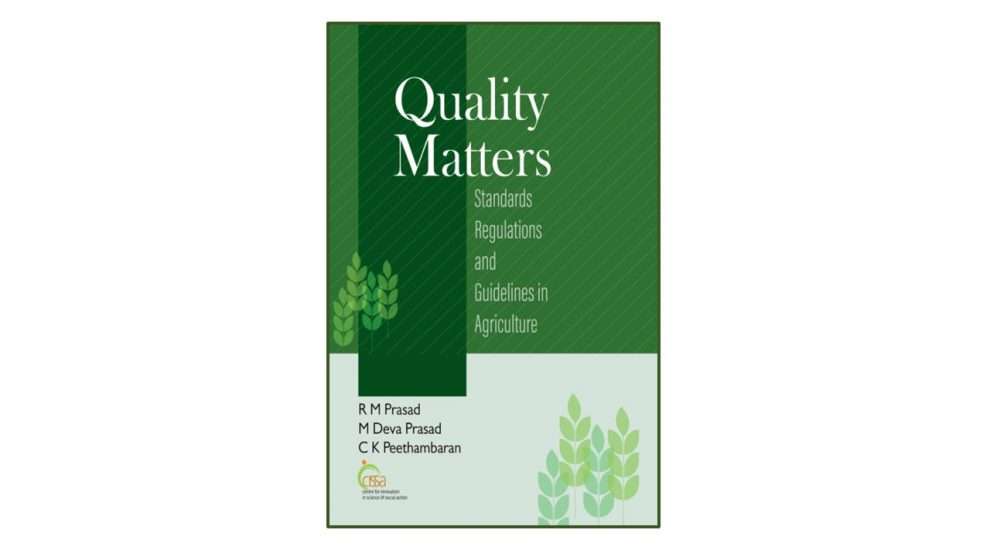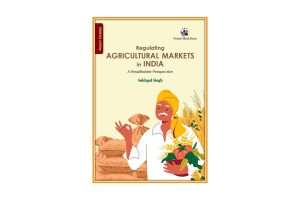R M Prasad, M Deva Prasad and C.K. Peethambaran 2021
Publisher: Centre for Innovation in Science and Social Action (CISSA),
Thiruvananthapuram, Kerala
Pages: 350
Price: INR 700
ISBN 978 81 948175 3 6
Over a period of time, the volume, value and range of food traded globally has grown exponentially. Due to overall economic and technological development and rising standards of living, there are stringent regulatory measures currently in the domain of agriculture. With the Codex Alimentarius international food standards (https://www.fao.org/fao-who-codexalimentarius/codex-texts/list-standards/en/) in place, consumers can now trust the safety and quality of the food products they buy and importers can be sure that the food they ordered will be in accordance with these specifications. This increased awareness has resulted in higher demand from consumers for safe and quality food products. In India too, the importance of quality standards in agriculture has increased with more enlightened consumers. The consumers in India are becoming increasingly aware about the nature of farm produce and are willing to pay a higher price for quality.
This book, “Quality Matters: Standards, Regulations and Guidelines in Agriculture”, perhaps may be the first comprehensive volume that can be easily referred to understand a wide range of aspects relating to quality of food products. Safety, efficiency, reliability, credibility and traceability are the core areas that matter when it comes to quality. Worldwide, there are multiple agencies and organisations dealing with quality parameters. Country quality regimes for evaluation and setting standards, regional economic blocks and union of countries across continents fix or revise parameters for quality of food products imported and exported.
In many cases, each country has its own standardisation system set by National Organisations such as American National Standards Institution (ANSI), German Institute for Standardization (DIN), British Standards (BS), Standards Australia (AS). Dealing with each sector is a time consuming and laborious exercise. It is almost impossible to find compiled text to get hold of the intricacies of the subject. With ISO certification, now almost all the country-specific agencies have adopted ISO norms for certification but these are not inter-governmental. The arrival of Codex standards has brought in convenience since the global interface is enabling a near consensus on standards that can be referred to as a via media. As the quality check of any agricultural produce starts from the farm and ends at the fork, constant vigil and attention is required at every step right from the selection of seed or planting material. The quality parameters of a product are not static and will vary continuously. This necessitates continuous knowledge upgradation and constant monitoring.
The book is organised in 13 chapters: Quality Standardization Bodies in Agriculture; Quality Regulations and Regulatory Bodies in Agriculture; Agricultural Extension Services for Quality Agriculture; Quality standards of Natural Resources; Quality Standards of Farm Inputs; Quality issues in Animal Husbandry and Fisheries; Standards and Guidelines for Post-Harvest management; Regulations and Standards for Agricultural Marketing; Standards and Guidelines for Agriculture, Animal Husbandry, Fisheries and allied enterprises; Standards and Regulations for Food Quality and Safety; Information Technology and Biotechnology in Agriculture; and Conclusion and Way Forward.
My sincere appreciation to the team of scientific experts, which includes R.M Prasad, M Deva Prasad and C.K. Peethambaran, who took pains to write a comprehensive book on the topic of quality of agricultural products that can be easily referred to touch base wide aspects relating to quality and the concerns. It is interesting to note the inserts in the book with nice pointers to topics such as, standardization, honey standards, how quality made a difference, quality standards proposed by India will apply to global trade in potatoes, rainforest alliance sustainable agriculture, Standardisation Testing and Quality Certification (STQC), Ramsar Convention on wetlands, General Environment Acts in India, Animal Intrusion Detection and Repellent System (ANIDERS) to solve man-animal conflicts, National Agricultural Drought Assessment and Monitoring System (NADAMS) for monitoring agricultural drought, Svalbard Global Seed Vault, pesticide tragedies, need to standardise value chain process to bridge supply chain gap, which enhance readability.
This book would be of great interest to both beginners and experts working in the area of quality and also to researchers who are working in this area.
It will help all of them to understand the many initiatives, actors and organisations involved in setting standards, monitoring and surveillance besides certifications. The list of acronyms given in the book narrates the wide range of operations within the ambit of quality administration in the world. While this can be a ready reference for a researcher and a practitioner, it also serves the purpose of guiding beginners to make a dent in the big world of quality regime.
The planning that has gone behind in structuring the chapters are to be appreciated as almost every aspect has been dealt with in a way that can guide teachers, students, people in agriculture and allied fields, extension personnel, progressive farmers, FPOs and agripreneurs, besides the public at large. Being a first attempt, the shortfalls that can be pointed out can be addressed in the next edition. The three authors deserve a special mention and applause for this bold initiative where I think every possible pebble has been accounted for.
For more details about the book, contact cissaagri@gmail.com
Dr. P. S. Sreekantan Thampi
 Dr. P. S. Sreekantan Thampi is former Deputy Director of Spices Board who had handled promotion and publicity programmes for Indian spices across the globe. He has a PhD in market promotion of spices. Dr Thampi had a colourful career as a journalist with The Indian Express for nearly ten years prior to joining the Spices Board. He is a subject matter specialist for benchmarking of India GAP in spices under QCI. He is a Consultant for the UNDP sponsored project for Block Chain Technology in Spices in association with Spices Board. Dr Thampi is Advisor, World Spice Organisation, since 2019. He served as Chief Co-ordinator of Espice Bazaar Traceability Project for spices. Dr Thampi can be contacted at drpssthampi2000@gmail.com
Dr. P. S. Sreekantan Thampi is former Deputy Director of Spices Board who had handled promotion and publicity programmes for Indian spices across the globe. He has a PhD in market promotion of spices. Dr Thampi had a colourful career as a journalist with The Indian Express for nearly ten years prior to joining the Spices Board. He is a subject matter specialist for benchmarking of India GAP in spices under QCI. He is a Consultant for the UNDP sponsored project for Block Chain Technology in Spices in association with Spices Board. Dr Thampi is Advisor, World Spice Organisation, since 2019. He served as Chief Co-ordinator of Espice Bazaar Traceability Project for spices. Dr Thampi can be contacted at drpssthampi2000@gmail.com





Add Comment